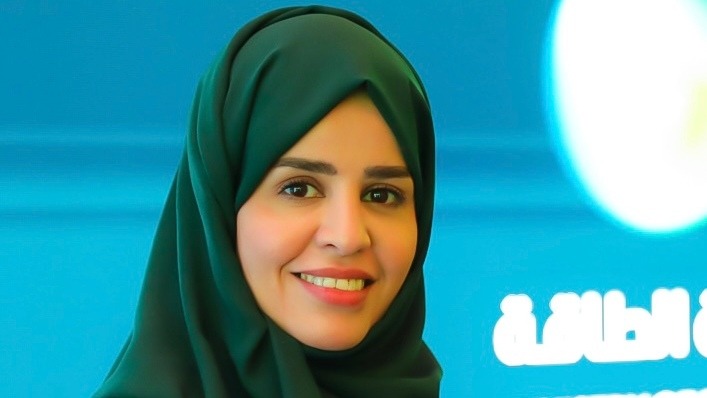Powering KSA’s future: Alumna highlights KAUST’s role in developing Saudi energy labor force

KAUST alumna Haleema Alamri is Director of the Innovation and Technology Observatory at the Saudi Ministry of Energy.
Haleema Alamri, Director of the Innovation and Technology Observatory at the Ministry of Energy, embodies King Abdullah University of Science and Technology’s (KAUST) commitment to the Kingdom’s sustainable energy future. Her work supports a domestic skilled-leadership pipeline, advancing the Ministry’s energy localization goals.
“KAUST plays a crucial role in preparing talent to excel in the energy sector,” said Alamri, who earned a Ph.D. in physical sciences and engineering from KAUST in 2016. “KAUST is well-aligned with the vision and mission of the Kingdom and considers itself a key player in that ecosystem. It has all the necessary resources to do so — world-class education and research facilities, as well as strong and growing ties within the Kingdom.”
Her journey through academia, Saudi Aramco, MIT and the Ministry of Energy illustrates KAUST’s successful role in developing leaders critical to the Kingdom’s energy future. The Ministry aims for a 75-percent localization rate across the energy sector, including domestic job creation — an effort that Alamri fully supports as part of Saudi Vision 2030’s goal to boost competitiveness in the energy industry.
“The Kingdom has a leadership footprint in the energy sector. It’s part of our DNA to support it. Saudis feel this obligation not only toward the Kingdom but also toward the world for reliable and sustainable energy sources.”
Drawn to KAUST
After earning a Bachelor of Applied Science in chemistry from Umm Al-Qura University in Mecca, Alamri completed her master’s in chemistry and polymer science at Canada’s University of Waterloo. Though accepted to the prestigious McGill University for her Ph.D., KAUST recruiters persuaded her in 2012 to return to the Kingdom, drawn by the University’s state-of-the-art facilities, distinguished faculty, and vibrant research ecosystem.
“I honestly found KAUST to be a unique university experience,” she said, adding KAUST provides a renowned platform for students to explore career and research opportunities in key Saudi industries, particularly energy. “We’re connected to industry early in our careers. Aramco and SABIC and DOW were just next door in the research park. The faculty networking opportunities were excellent. I was approached by a lot of companies while doing my Ph.D.”
Eventually, Alamri decided to work with Aramco, largely based its alignment with her education, passions and skills. However, her involvement in academic research was not over. After graduating in 2016, Aramco nominated Alamri for the MIT Ibn Khaldun Fellowship. She returned to North America, this time to the U.S., for postdoctoral work amplifying the impact of Saudi women through hands-on research.
“This was heaven for me. I was already working with industry and had a lot of insights into solving industry challenges. Then I worked as a postdoc at MIT. Everything combined to enhance my skills in the energy sector.”
Back to KAUST
While at MIT, Alamri contributed to research, patents and publications, and she attended leadership courses. She eventually returned to Saudi Arabia, transitioning to the Aramco KAUST Center in 2018 and helping to establish its strategies. There, she had multiple leading roles, balancing team leadership with strategy development.
In 2021, Aramco nominated Alamri for Harvard Business School’s highly competitive 10-month “Young Leaders Program,” designed for future energy sector leaders and enabling her to take on a larger role within the company. She also contributed to establishing the non-metallic hub and association at King Salman Energy Park (SPARK).
“I stayed for three years, working as a team lead. Then I started working in a bigger position as acting chief technologist for the non-metallic division, and eventually as the acting manager for Aramco R&D center at KAUST. During this time, I had a lot of involvement with KAUST leadership and academic institutions.”
Alamri joined the Ministry of Energy in 2022, leveraging her extensive experience to take on a more strategic role supporting the entire ecosystem of energy research and development. The director considers this position as a natural progression in her career, focused on shaping and advancing the Kingdom’s energy strategies.
She said: “My journey through KAUST helped me connect a lot of dots. Looking back at KAUST and the other institutions I’ve worked with, I think KAUST is unique in its agility, quickly adapting to what’s happening in the Kingdom and adjusting its agenda accordingly.”
Why KAUST matters
KAUST is deeply connected to the energy sector, driving innovation and technology development across the value chain, according to Alamri. She describes KAUST as an “oasis of science” where scientists and technology developers thrive. The University’s unique combination of research, industry collaboration and entrepreneurial support creates an ideal environment for talent. Alamri hopes KAUST continues empowering future leaders in vital areas of the economy.
“I think KAUST is leading and will continue to lead in the energy sector. We’ve seen KAUST engage in many activities within the energy ecosystem at different levels, aligning its efforts with the Kingdom’s priorities. KAUST will play a critical role in the energy sector moving forward.”
For their part, she noted, Aramco and other big energy companies such as SABIC recognize KAUST’s importance in shaping energy professionals, often sending students as part of special programs. Many KAUST alumni work with Aramco and SABIC, reflecting strong connections between these organizations and KAUST. Meanwhile, at the Ministry, Alamri said she actively recruits KAUST graduates, acknowledging their key role in the Kingdom’s energy sector.
“KAUST has strong entrepreneurial capacity. It’s a very interdisciplinary institute. There’s significant intellectual property developed at KAUST to support the Kingdom. Those are just some of the reasons why KAUST not only can lead but also accelerate talent development in energy.”

